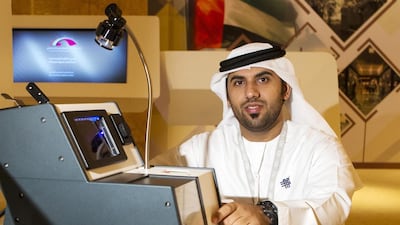An Emirati inventor who developed a high-tech method to detect passport fraud has received an international honour.
Amer Al Jabri is the brains behind the E7 reader, which scans a passport’s details and can identify faked or altered documents in less than five seconds.
The innovation is now widely used across the UAE.
Traditionally, two separate devices are used for reading and testing the validity of a passport, but Mr Al Jabri's invention carries out both tasks at once – saving valuable time and money.
His achievement secured him a silver medal at the Seoul International Invention Fair 2020 on Friday.
The 32-year-old said he was delighted to see his work recognised on the global stage.
“I was expecting the gold medal, but I am happy and proud of winning the silver. There were more than 700 participants from 45 countries,” he said.
Mr Al Jabri was inspired to create the E7 reader in 2015, after working for a decade in the passport examination lab at Dubai International Airport.
The device has come a long way since then.
From the manual version, which he crafted using a selfie stick and a lamp, the E7 is now a sophisticated product used by passport control officials in the UAE and abroad.
After receiving the support of the Ministry of Interior’s Innovation Centre, the UAE-made E7 has been used at all of the country’s land, air and maritime borders since 2018.
It has also been acquired by a number of countries including a European and an African country. Mr Al Jabri preferred not to name the countries.
The E7 is regularly updated to ensure officials can keep track with increasingly elaborate fraud attempts.
“It can read up to 1,763 travel documents from around the world, and it gets updated every three months," said Mr Al Jabri.
It has been a whirlwind few days for Mr Al Jabri.
He sat for a virtual interview to discuss his invention with the fair’s organisers on December 1, via Zoom.
“And on December 4 they announced the results online at 6am. I stayed up all night waiting for the results,' Mr Al Jabri said.
He said there were many sophisticated entries from countries that are highly advanced in innovation, such as Japan, the US and the host country South Korea.
Mr Al Jabri’s invention was one of many to be rewarded at the ceremony.
Other inventors representing the Gulf region at the fair from Oman, Saudi Arabia, Bahrain and Qatar won bronze medals, while a Kuwaiti professor won the gold medal.
The gold medallist Salah Al Ali invented a monitoring system for sudden infant death syndrome. The system alerts parents, including the deaf and the blind, of sudden changes in their infants’ health conditions.
Ibrahim Al Mutawa of Bahrain invented an automated solar panel cleaning device, which calculates the percentage of dust and humidity in the atmosphere and on solar panels every hour.
SIIF’s grand prize this year went to a team of researchers from the Malaysian Nuclear Agency, for an invention titled hybrid radiation and peroxide prevulcanised natural rubber latex.


